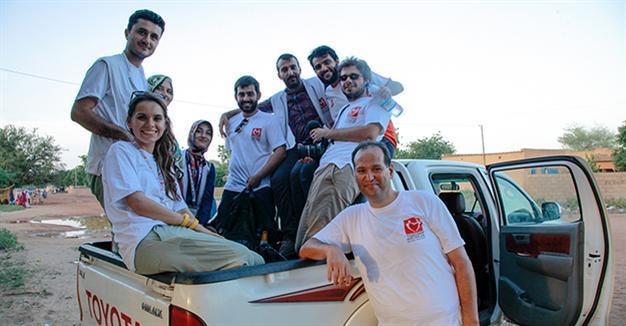Doctors Worldwide Turkey: A lifetime dedicated to humanity
ANKARA
 Designated by the United Nations as World Humanitarian Day in 2009, Aug. 19 serves as an annual reminder of those who have lost their lives for humanitarian causes, while recognizing the sacred mission that the humanitarian workers around the globe are engaged in, Doctors Worldwide Turkey has said.
Designated by the United Nations as World Humanitarian Day in 2009, Aug. 19 serves as an annual reminder of those who have lost their lives for humanitarian causes, while recognizing the sacred mission that the humanitarian workers around the globe are engaged in, Doctors Worldwide Turkey has said.“Active in humanitarian work since 2000, Doctors Worldwide Turkey (DWWT) commemorates World Humanitarian Day, Aug. 19, with its 14,000 volunteers and 169 personnel. Marking the day on which the then Special Representative of the Secretary-General to Iraq and 21 of his colleagues were killed in the bombing of the U.N. Headquarters in Baghdad, Aug. 19 is commemorated as World Humanitarian Day around the globe,” they said in a press statement.
Doctors Worldwide is an independent charity, funded entirely by private donations. It is not a faith organization or a political one, but says it recognizes the importance of cultural, religious and universal humanitarian values. “By linking medical expertise with cultural knowledge and values, we can build capacity, empower local communities, and produce effective solutions that will leave a lasting legacy long after we have gone,” is its motto.
“This day draws attention to the fact that millions of humanitarian workers around the world, and 10,000 of them working in Turkey, serve humanity in some of the most difficult circumstances,” it stated.
“Humanitarian work needs a lot of dedication and selfless vision, as it involves dangers with very minimal remuneration. But it gives the person moral satisfaction as it offers lifesaving services to people in great need,” said Dr. Abdi Dalmar, a faculty member at İbn-i Sina University, Somalia, and a volunteer in DWWT.
‘Marmara Earthquake was a turning point in my life’
Commenting on why she chose to work in humanitarian aid, Damla Demirel, the program coordinator for DWWT, cited the devastating Marmara Earthquake of Aug. 17, 1999 as a key milestone.
“As a 19-year-old student studying at Kocaeli University, it was the first time that I witnessed such a massive disaster. Turkey was taken unaware. Government institutions and NGOs were inadequate to provide services and 285,000 homes were damaged. Having graduated after spending four years in a city where neighbors had run to each other’s rescue and were now trying to pick up the pieces of their lives, I was determined to work in the field of humanitarian aid … and to put my heart and soul into the field of disaster mitigation to make our country more prepared for such massive disasters,” Demirel said.
‘48 hours without food’
Humanitarian workers serve in physically challenging places, such as refugee camps, disaster areas, close combat areas and so on, where it sometimes becomes impossible to meet one’s basic human needs.
“In 2011, when the influx of refugees from Somalia was coming to Kenya, I was involved in assisting the refugees at the Dadaab Refugee Camp. I was shocked to see a family walking for more than 48 hours without food and some of them were witnessing the death of their siblings and family members on the way to look for a better place. We were very busy trying to assist them and to meet their urgent needs of food and health. It was a very shocking experience to see the degree of hunger people were suffering from and their survival to live,” said Dr. Abubakar Badawy, DWWT Kenya Representative.
‘Humanitarian worker: Simple, modest and thoughtful’
Owing to the difficult circumstances in which they work, humanitarian workers have to possess some distinguishing features, according to Mohammed Alkhatib, Palestine representative of DWWT.
“You must be open to hear all from the needy people and must have a big understanding of general problems that people can have in disaster areas. You also must have even a deeper understanding of the rights of any human being living on this earth. You must be simple and thoughtful,” Alkhatib said.
















